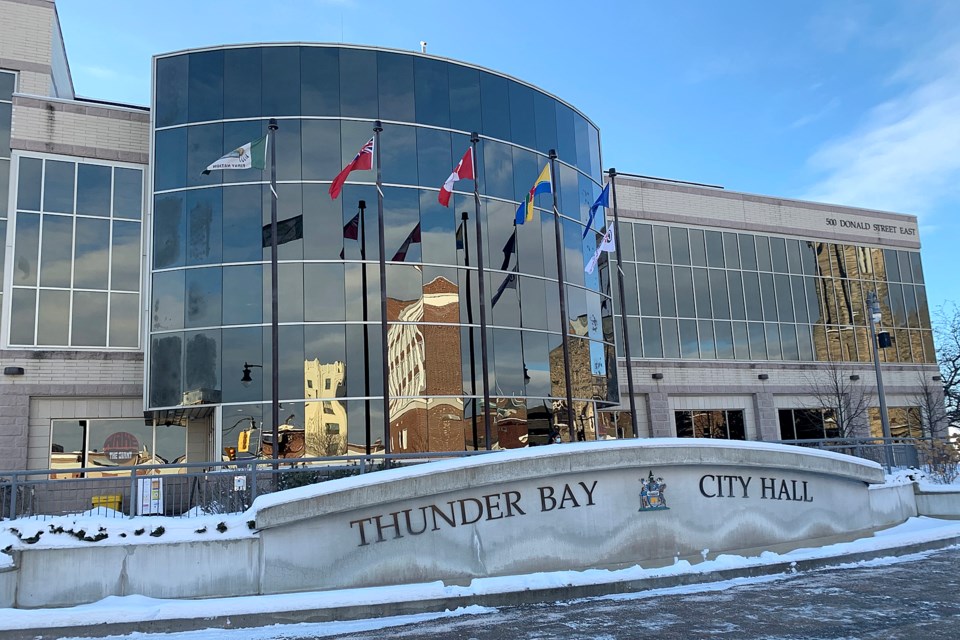THUNDER BAY – The City of Thunder Bay’s 2021 budget has been given the rubber stamp with the lowest percentage increase to the tax levy in a decade.
Councillors approved a 1.83 per cent hike to the levy (1.6 per cent after growth) as they ratified the budget Monday night, confirming their unanimous Feb. 2 vote to approve the document.
That's well below the 10-year average of 2.35 per cent after growth, despite the city’s assessment base creeping upwards by only an estimated $465,000.
“Congratulations, everybody,” Mayor Bill Mauro said to his colleagues following the vote. “1.6 per cent after growth – something to be proud of.”
Councillors made no last-minute moves to amend the budget Monday, after making a number of changes over four review meetings that trimmed the tax levy hike from a proposed 2.15 per cent (2 per cent after growth).
Members of council had expressed a firm desire to minimize the tax burden on residents and businesses alike this year, given the financial stresses many are facing due to COVID-19.
Those were emphasized by Chamber of Commerce president Charla Robinson and others during pre-budget consultations.
“Every reduction you make acknowledges the hard reality confronting many of our citizens, demonstrates empathy with their struggles, and leaves a little more money in their pockets for daily purchases," she said at the time.
Council trimmed $150,000 from the tax levy by deferring updates to an environmental assessment for the Northwest Arterial. Ontario isn't expected to move on the project anytime soon, Mayor Bill Mauro said, though councillors agreed it should be a priority.
They also made some smaller cuts, removing $30,000 for duct cleaning at the Victoriaville Centre.
Other reductions came through adjustments to projected costs, with insurance rates rising by $238,000 less than estimated, and the Thunder Bay District Social Services Administration Board’s 2021 levy $168,000 lower than expected.
Some deeper cuts, including removing funding from the CEDC, Clean, Green & Beautiful committee, and closing Churchill Pool, were rejected by councillors.
Major outside factors include rising WSIB costs that will add $800,000 at Superior North EMS alone, a $600,000 increase to CPP and other benefits, and insurance, still set to increase by over $700,000.
On the other side of the ledger, the city expects to find nearly $1 million in vacancy gap savings by putting off rehiring some positions, and around $600,000 through reduced LED street light costs.
The pandemic will have an estimated impact of over $8 million in 2021. COVID costs remain unpredictable, however, city staff warned, as does the potential for further government relief.
Those COVID-19 costs will be covered with millions in federal/provincial COVID relief funds left over from 2020 and some one-time savings approved by councillors, with a remaining $3.9 million bring drawn from the city's "rainy day" stabilization reserve fund, which has a current balance of over $12 million.
Councillors approved six one-time cost saving options from a menu of 40 put forward by administration to reduce the drain on the stabilization reserve.
Those included deferring backup generator replacement at Fire Station #3 on Water Street ($150,000), cutting a planned pedestrian crossover ($75,000), deferring property acquisition for the Northwest Arterial highway improvement project ($50,000), and temporarily closing counter service for water and tax payments ($41,000).
While looking to contain costs, councillors also sought to make an impact by boosting funding in a few areas.
They voted to include $250,000 in the capital budget for a possible environmental assessment for a second access on Parkdale Boulevard, an additional $83,800 for the Community, Youth & Cultural Fund, an extra $10,000 for the Waterfront BIA, and a combined $45,000 in new funding for city strategies on poverty, food, and aging.
The city will also absorb a projected $68,000 in lost revenue after cancelling small planned increases to transit passes. The move was a largely symbolic gesture in the face of a campaign calling for the city to make public transit entirely free to ride, reducing fares a dollar at a time.
Thunder Bay Transit has been directed to study that proposal.
The water rate will increase by 3.5 per cent, representing under $22 for the average household using 200 cubic meters of water in a year, the city estimates.
The wastewater surcharge will also increase by 3.5 per cent, upping costs for the average household by just under $20.
